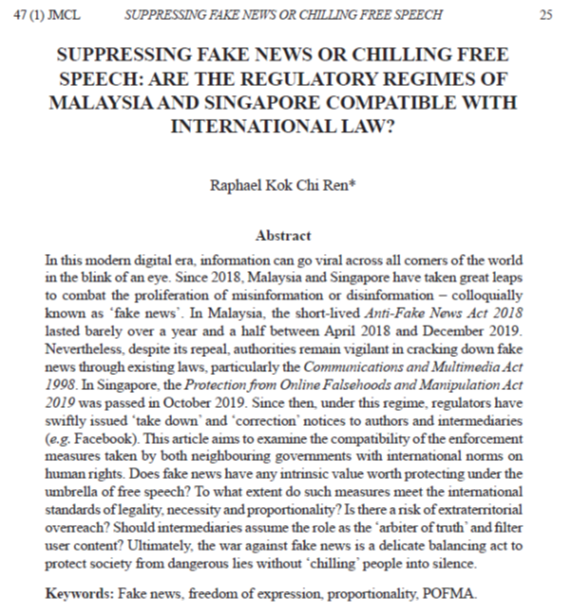Suppressing Fake News or Chilling Free Speech
Are the Regulatory Regimes of Malaysia and Singapore Compatible With International Law?
Keywords:
POFMA, Fake news., freedom of expression, proportionalityAbstract
In this modern digital era, information can go viral across all corners of the world in the blink of an eye. Since 2018, Malaysia and Singapore have taken great leaps to combat the proliferation of misinformation or disinformation – colloquially known as ‘fake news’. In Malaysia, the short-lived Anti-Fake News Act 2018 lasted barely over a year and a half between April 2018 and December 2019. Nevertheless, despite its repeal, authorities remain vigilant in cracking down fake news through existing laws, particularly the Communications and Multimedia Act 1998. In Singapore, the Protection from Online Falsehoods and Manipulation Act 2019 was passed in October 2019. Since then, under this regime, regulators have swiftly issued ‘take down’ and ‘correction’ notices to authors and intermediaries (e.g. Facebook). This article aims to examine the compatibility of the enforcement measures taken by both neighbouring governments with international norms on human rights. Does fake news have any intrinsic value worth protecting under the umbrella of free speech? To what extent do such measures meet the international standards of legality, necessity and proportionality? Is there a risk of extraterritorial overreach? Should intermediaries assume the role as the ‘arbiter of truth’ and filter user content? Ultimately, the war against fake news is a delicate balancing act to protect society from dangerous lies without ‘chilling’ people into silence.
Downloads



